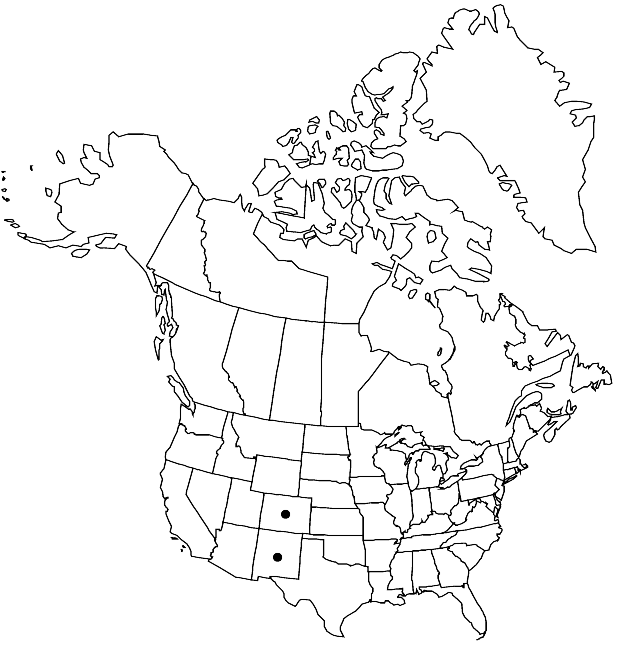Difference between revisions of "Boechera spatifolia"
Harvard Pap. Bot. 11: 84. 2006.
FNA>Volume Importer |
FNA>Volume Importer |
(No difference)
| |
Revision as of 20:23, 24 September 2019
Perennials; short- to long-lived; sexual; caudex usually not woody (rarely with persistent, crowded leaf bases). Stems simple or few to several per caudex branch, arising from center of rosette near ground surface, 1.5–3.5(–5) dm, densely pubescent proximally, trichomes simple mixed with short-stalked ones, 2-rayed, 0.3–0.7 mm. Basal leaves: blade narrowly oblanceolate, 1.5–3(–4) mm wide, margins entire, strongly ciliate at least along petiole, trichomes (simple), to 1 mm, surfaces glabrous or sparsely pubescent, trichomes simple and short-stalked, 2-rayed, 0.3–0.7 mm. Cauline leaves: 5–15(–20), often concealing stem proximally; blade auricles 0.5–1.5 mm, surfaces of distalmost leaves usually glabrous. Racemes 10–30-flowered, usually unbranched. Fruiting pedicels horizontal or slightly descending, curved or angled downward, 6–10(–15) mm, usually glabrous, rarely sparsely pubescent, trichomes spreading, simple. Flowers divaricate-ascending at anthesis; sepals pubescent; petals usually white, rarely pale lavender, 3–3.7(–4) × 0.5–0.8 mm, glabrous; pollen ellipsoid. Fruits pendent, not appressed to rachis, rarely slightly secund, straight or gently curved, edges parallel, 3.3–5.7 cm × 1.2–1.8 mm; valves glabrous; ovules 90–126 per ovary; style 0.1–0.4 mm. Seeds biseriate, 0.7–0.9 × 0.5–0.6 mm; wing distal or, sometimes, absent, 0.05–0.1 mm wide. 2n = 14.
Phenology: Flowering May–Aug.
Habitat: Rocky slopes and gravelly soil in sagebrush, pinyon-juniper woodlands, open conifer forests and subalpine meadows
Elevation: 1800-2800 m
Discussion
Boechera spatifolia is a sexual diploid that usually has been treated as a variety of Arabis (Boechera) fendleri but appears to be sufficiently distinct to warrant recognition at species level (see M. D. Windham and I. A. Al-Shehbaz 2006 for detailed comparison). There is little geographic overlap between the two, with B. spatifolia confined to the mountains of central Colorado and north-central New Mexico and B. fendleri ranging from western New Mexico and the Four Corners region through northern Arizona to southern Nevada.
Selected References
None.
